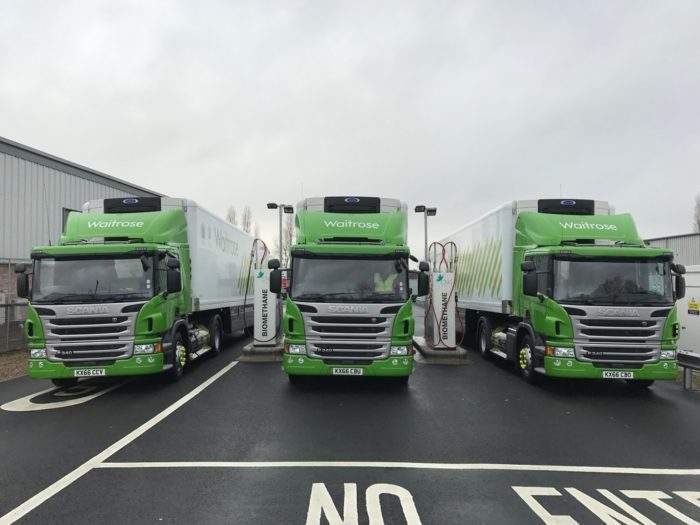
British supermarket Waitrose has become the first in Europe to power its delivery trucks using food waste.
As part of its sustainability push the supermarket, which is owned by the UK’s largest employee-owned retailer — the John Lewis Partnership (JLP) — will use a new type of tank that keeps trucks motoring on biomethane gas for 500 miles without the need to refuel.

Access deeper industry intelligence
Experience unmatched clarity with a single platform that combines unique data, AI, and human expertise.
“We will be able to make deliveries to our stores without having to refuel away from base,” said Justin Laney, who manages JLP’s fleet of 3000 commercial vehicles and 1500 cars.
“Using biomethane will deliver significant environmental and operational benefits to our business. It’s much cleaner and quieter than diesel, and we can run five gas trucks for the same emissions as one diesel lorry,” he added.
The biomethane fuel made from food waste emits 70 percent less carbon dioxide than diesel.
Ten Waitrose lorries will run on the green fuel, delivering to stores in the Midlands and northern England.

US Tariffs are shifting - will you react or anticipate?
Don’t let policy changes catch you off guard. Stay proactive with real-time data and expert analysis.
By GlobalDataAlthough biomethane costs 35 to 40 percent less than diesel, each of Waitrose’s new trucks cost 50 percent more than a diesel powered one.
However, the upmarket grocer insists that the extra cost will be repaid in fuel savings of £15,000 to £20,000 a year depending on mileage.
Manufactured by Swedish truck maker Scania, the fleet is the first in Europe to use carbon fibre tanks which hold more gas, allowing for longer distance journeys.
CNG Fuels, the company supplying Waitrose with the compressed natural gas (CNG) sourced from renewable biomethane said the fuel is “the most cost-effective and lowest carbon alternative to diesel for heavy goods vehicles (HGVs),” in a statement released yesterday.
.@waitrose launches Europe’s 1st fleet of #renewable #biomethane CNG-fuelled trucks with game-changing 500mile range https://t.co/7ZlKCKfweW pic.twitter.com/2RJciQD5Cf
— CNG Fuels (@CNG_FUELS) 9 February 2017
An estimated 50,000 trucks in the US already use CNG.
When asked why it has taken so long for a supermarket in Europe to introduce CNG-fuelled trucks, a CNG spokesman said:
“Waitrose has always been very focused on the environment. I’m not saying that other retailers have not been, but Waitrose has some key individuals who have been looking at more environmentally friendly fuel for a number of years while other supermarkets have not.”
The CNG Fuels spokesman also told Verdict that the company is in initial talks with Asda and another one of the big 5 UK grocers to invest in CNG-powered lorries.
But it remains to be seen whether other supermarket chains will champion sustainability and follow suit.
Environmental activists might argue they should, with transport accounting for around a quarter of UK greenhouse gas emissions.







